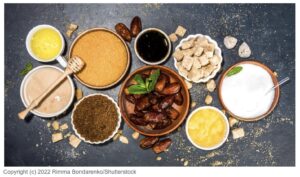
Humans naturally love sweet-tasting foods. These foods are usually energy-dense. They give us a burst of brain and muscle fuel. But energy-dense also means calorie dense and sweet foods can be fattening.
Refined white sugar or some variation of it is in almost every highly processed food imaginable and the harm it can cause to our health, from tooth disease to depression and heart disease, is well documented.
The Dextrose Evaluation (DE) scale
There are other ways to add some sweetness to your food besides table sugar. And, just as the heat of peppers is measured on the Scoville scale, the sweetness of different sweeteners is measured by its Dextrose Evaluation (DE), often called Dextrose Equivalent. Dextrose is a little less sweet than table sugar (i.e. sucrose). Table sugar is listed as a 1 on the DE scale and dextrose is a 0.9. Every other type of sweetener is then compared to dextrose as either more sweet (a number higher than 0.9) or less sweet (a number lower than 0.9). Some sweeteners such as stevia are more than 200x sweeter than dextrose or table sugar.
Some sweeteners such as maple syrup or dates do have some nutritional benefits. Some types of sweeteners hit your blood stream faster than others (this is called the glycemic index) and some add their own taste and texture. But to your body sugar is sugar is sugar. Use sparingly and enjoy it when you do.
Sweetener | What it is | DE level | Benefits/nutrients | Beware of |
Sucrose | White table sugar | 1 |
|
|
Brown sugar | White table sugar with molasses added (or with some of the molasses left in) | 1 |
|
|
Molasses | A dark brown, syrupy liquid that is a biproduct of sugar cane refining | .7 |
|
|
Honey | A liquid or soft solid made from flower nectar that is digested, concentrated and regurgitated by bees. | .76 |
|
|
Fructose | A naturally occurring sugar found in honey, tree and vine fruits, flowers, berries, and most root vegetables. | 1.2 – 1.8 |
|
|
Dates | The fruit of the date palm tree that can be pitted and eaten as is or used as a sweetening ingredient. Dates can also be made into a syrup. | .7 |
|
|
Agave syrup | The concentrated nectar from the agave plant | 1.5 |
|
|
Rice syrup | a natural sweetener made from rice and barley malt powder | .9 |
|
|
Maple syrup | Sap from the sugar maple tree is boiled down until it is thick and viscous. | .5 |
|
|
Corn syrup | A syrup made from the starch in corn. Corn syrup is not the same as high-fructose corn syrup which is used for industrial food production. | .5 |
|
|
Stevia | Derived from the leaves of the Stevia rebaudiana plant | 200 -300 |
|
|
Dextrose | A sugar molecule derived from corn or wheat. Dextrose is identical to sucrose except that the two molecules are mirror images of each other. | .9 |
|
|
Xylitol | An artificial sweetener called an alcohol sugar (any sweetener ending in “ol” is an alcohol sugar: erythritol, sorbitol, maltitol, mannitol, and lactitol) because its molecules look like both sugar molecules and alcohol molecules. | 1 |
|
|
Introducing ...Sunny Gold Sweet Mustard Pickles! Dismiss